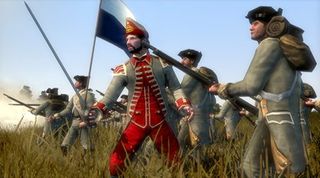Empire: Total War – hands-on
Strategy gaming's most epic franchise expands to encompass sea warfare
Equally, though, Empire is a game about history and color, and to that end, the devs are working to make each side tactically distinctive. “Are they like the Russians, with lots of infantry and cavalry who keep pushing forward and hope to win? Or are they like the French, who advance in column and use the Grand Battery to lay down covering fire?” asks Jamie Ferguson. “You should feel you’re fighting somebody rather than a machine.” This works on the commander level as well as the faction level, and you may learn that some generals are more prone to certain tactical approaches than others. On a more basic level, the team has concentrated on bolstering traditionally weak areas of the series. “One of the first things Richard [Bull, lead battle AI programmer] did was to look at some of the exploit tactics people used in our previous games and say, ‘I’m going to make sure none of them work anymore,’” says Mark Sutherns. The period itself already minimizes some of this - camping a corner is less effective when it makes you a perfect target for cannon fire.
Similar enhancements are seen in the diplomacy between governments, as you’re capable of offering a much greater variety of deals. There’s also increased transparency of an opposing nation’s feelings, so you should no longer be surprised by allies who become foes over something you didn’t realize they were touchy about - like, say, invasions. Similar innovations in government include democracies that swap their cabinet members with a shadow cabinet as their popularity wanes. These ministers replace the governors of individual regions - though there are still theater-wide-governors - and give bonuses in different areas. Since the shadow government has different strengths from the elected officials, you’ll find yourself in the novel situation of deliberately getting your government booted in order to seat people in power who are more suitable for your current predicament.

These sorts of political power games strongly tie into revolutions. They can be prompted for all sorts of reasons, and doing so gives you the option of choosing to fight for the status quo or for the would-be status quo - if you want to run a Republic, you may need to play to alienate your people to begin with. Or, you can play more considerately, spending your research resources on the sorts of enlightened strides in thinking that characterized the age. Of course, this will give the lower classes funny ideas about “rights." In Empire, a little knowledge is a dangerous thing to the established order. Creative Assembly promises a true research tech-tree for the first time in a Total War game, along with upper and lower social classes that are clearly modeled separately.
In other words, things happen for many reasons in this game. It’s a product of the team’s philosophy: “We like to think we’re a historical game, even though we don’t keep to history at every turn. The entire idea of the game is to create a counter-factual story... but at the same time, we want people to have some understanding that things aren’t independent of each other,” says Ferguson. “There are co-dependencies. To say that the French Revolution only occurred because of one thing is to grossly misunderstand the driving factors.” It’s telling that this, rather than the simple conquest method of winning an empire, is the basis for Empire’s concept of “prestige,” and whoever has the most - gained via research, economic power, and military victories in the year 1800 is declared the winner.

It's Total War’s key idea: History is yet unwritten. Empire promises the chance to write a fascinating new one of your own design. “Too often, you can look back at history and think there’s an inevitability,” says Ferguson, “But certainly, in 1700, no one would have thought that Britain was going to become the largest nation on Earth - except, possibly, the British. In the same way, no one would have thought Prussia would become one of the mightiest nations on earth.” Adds Russell, “None of these things are preordained.”
Sign up to the GamesRadar+ Newsletter
Weekly digests, tales from the communities you love, and more
Most Popular



